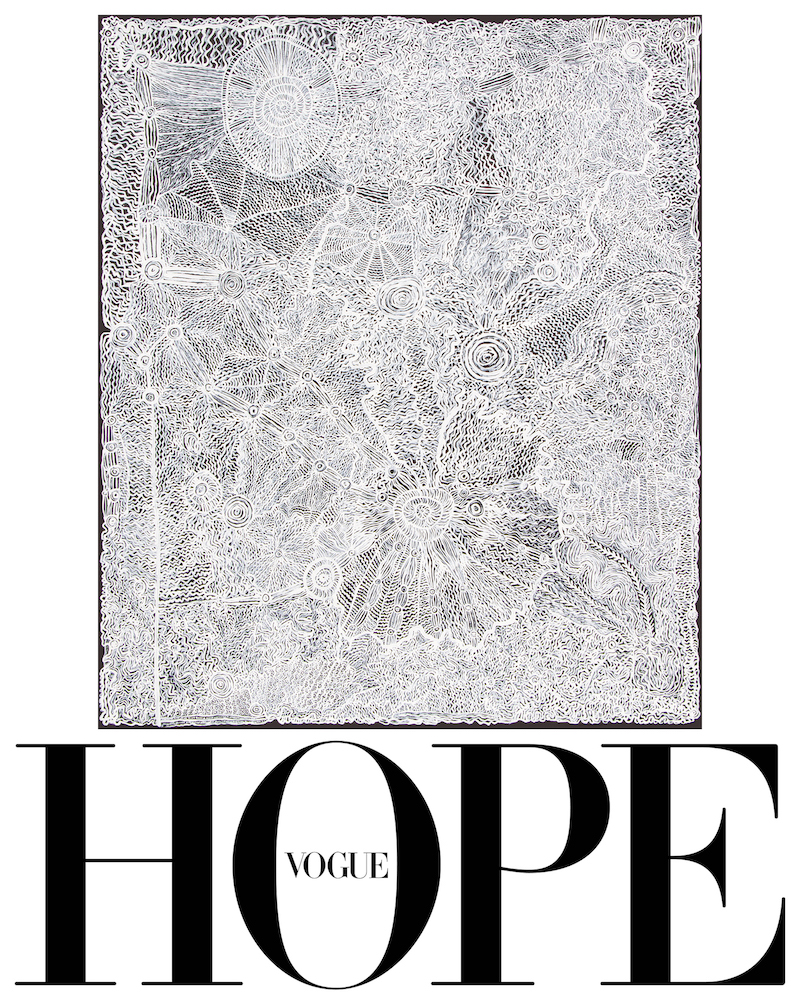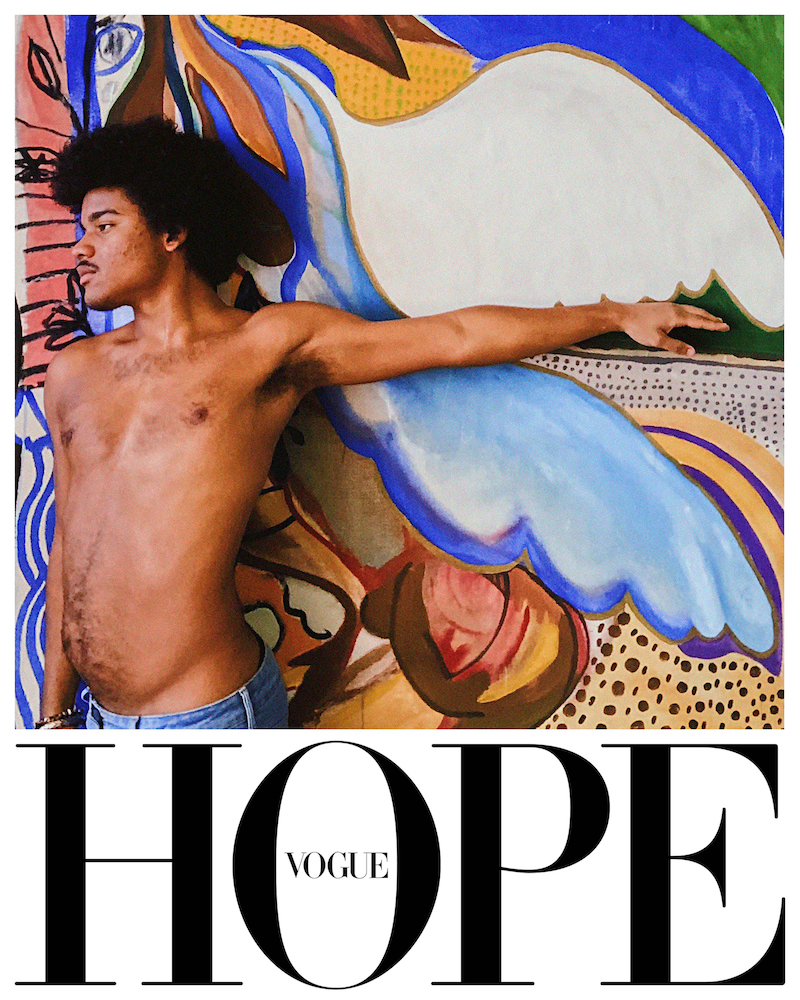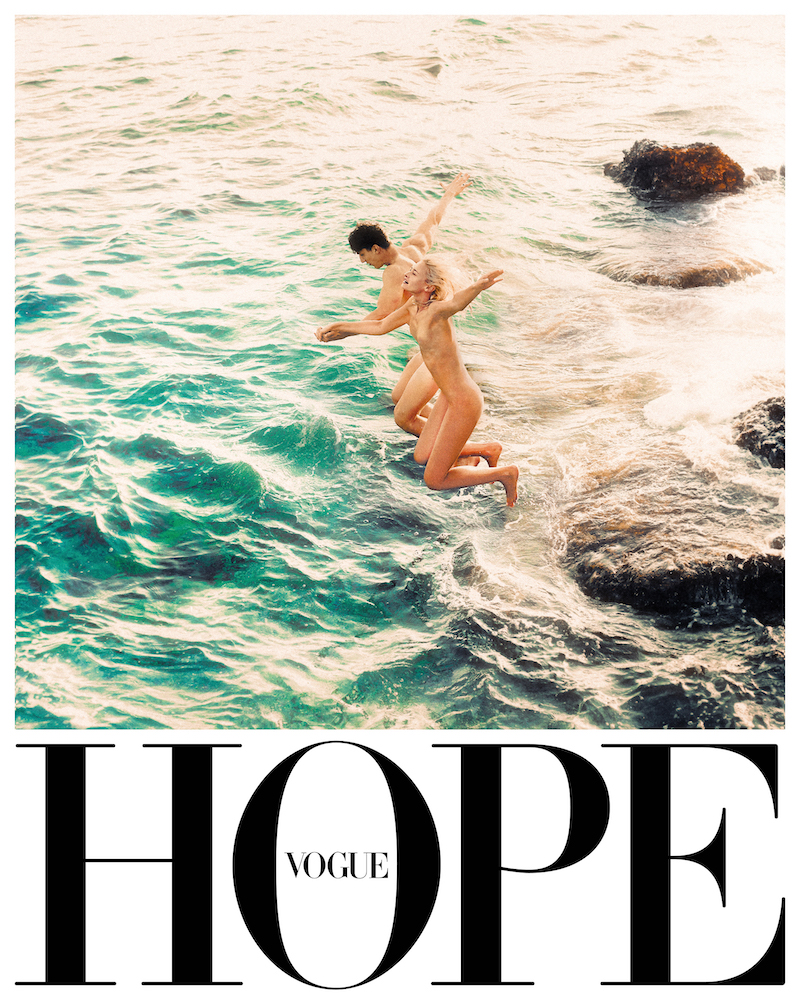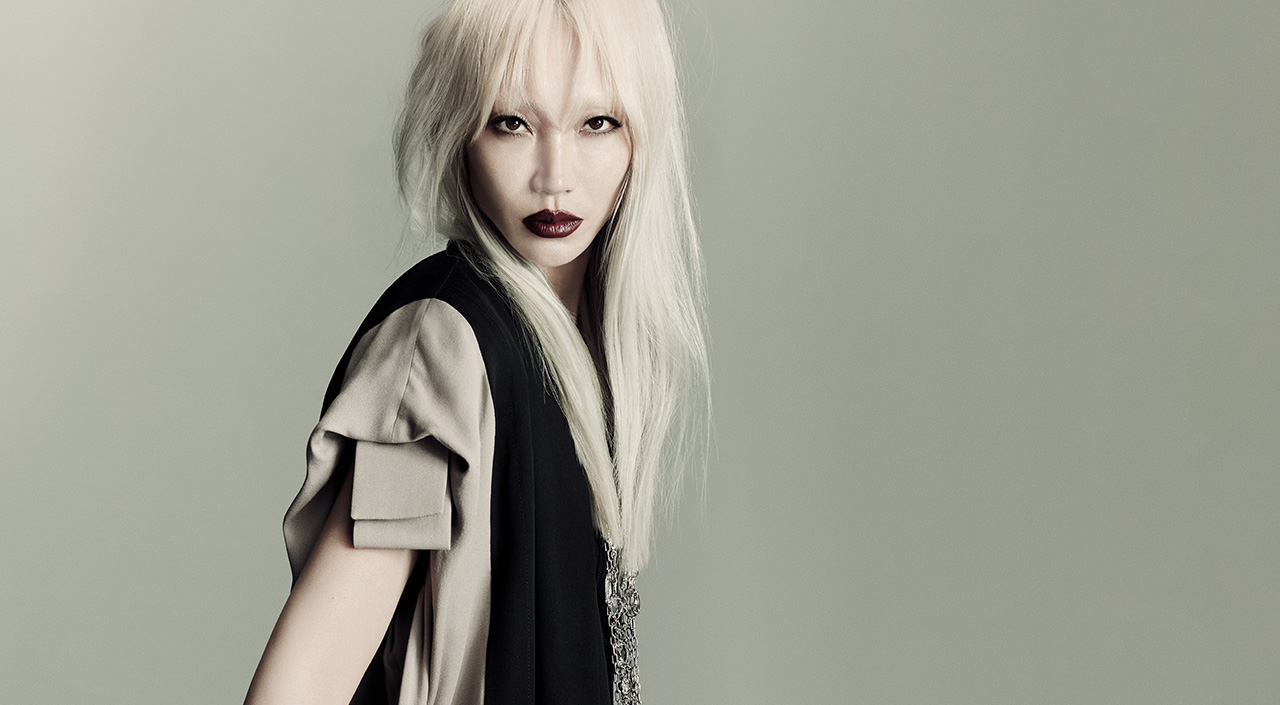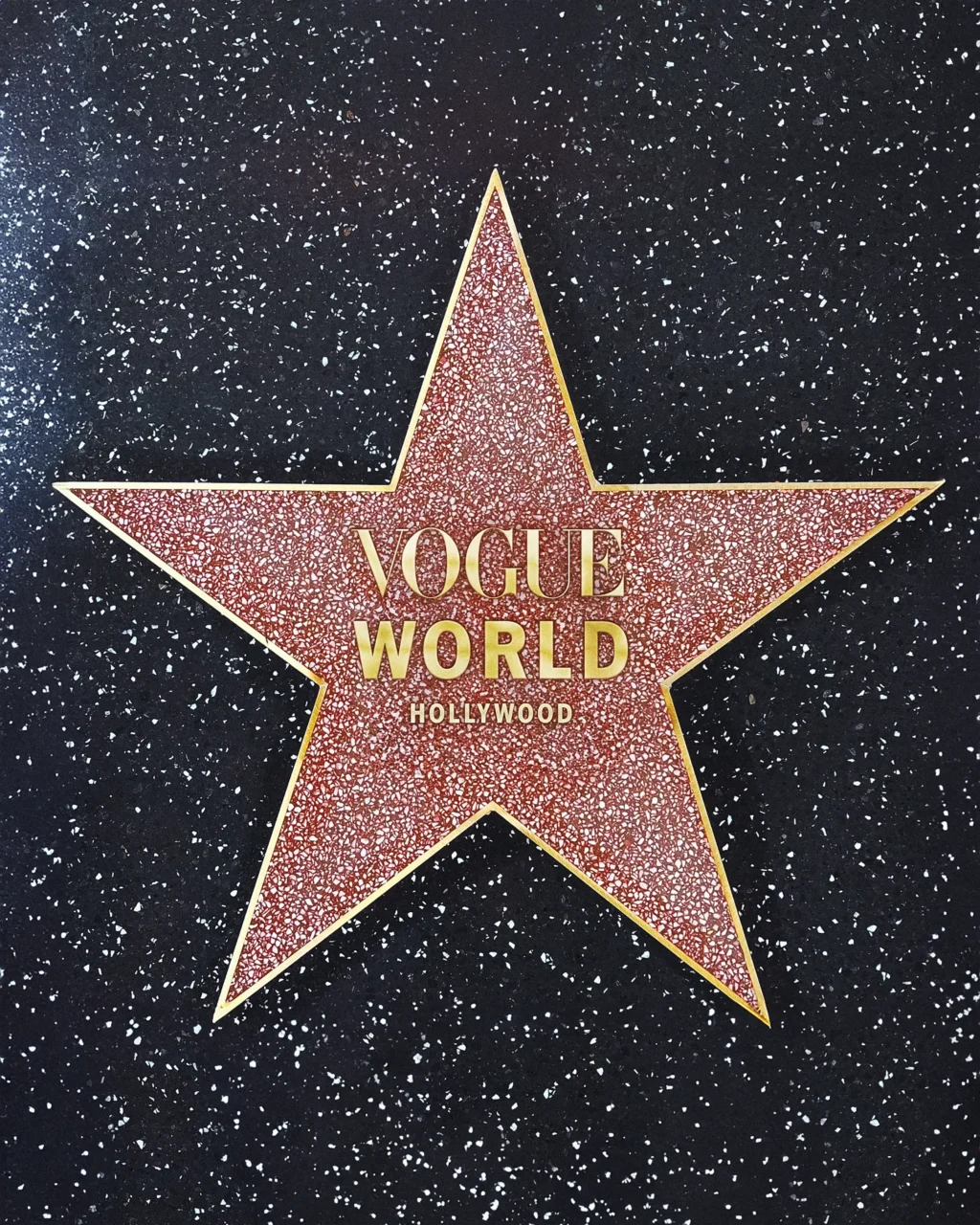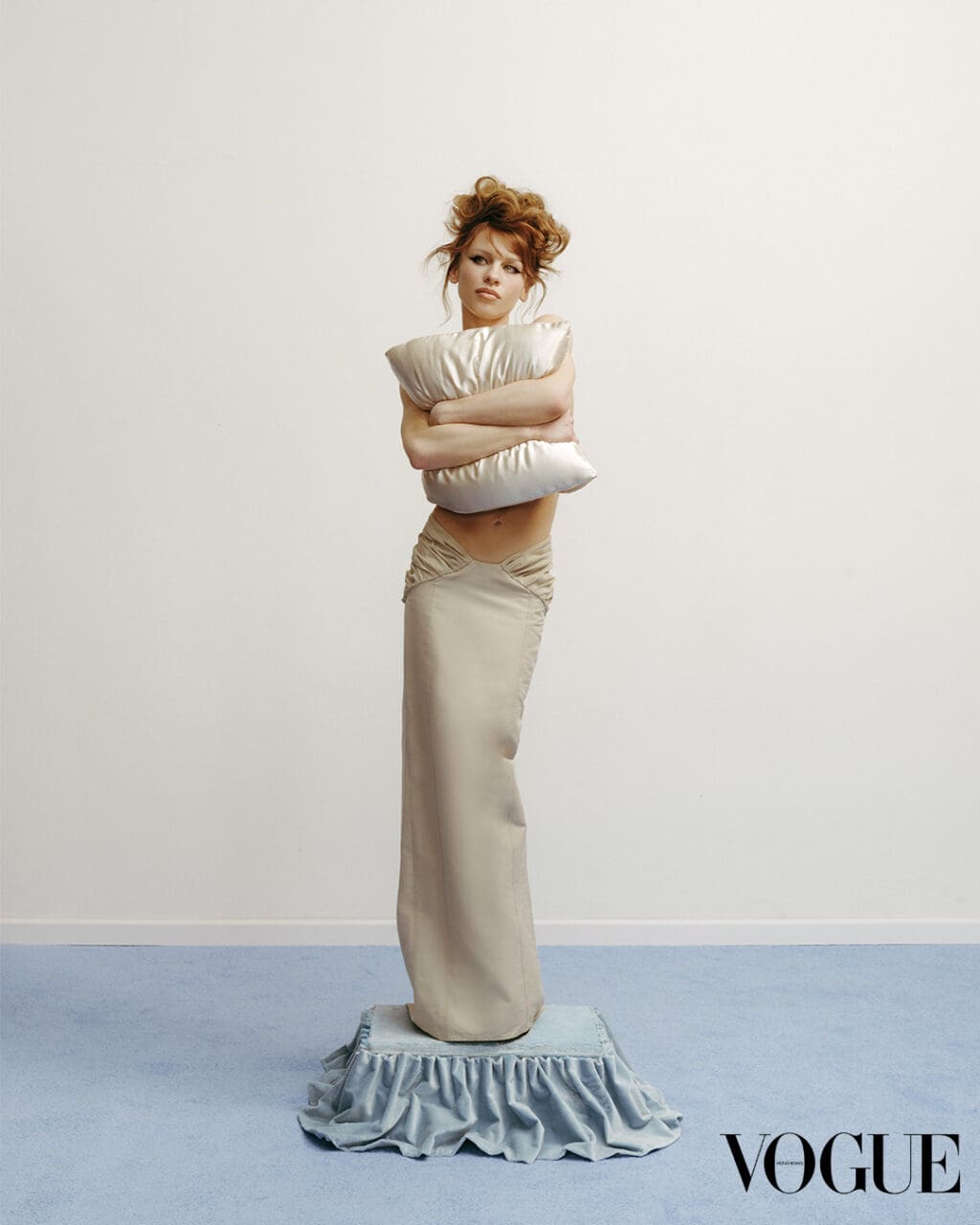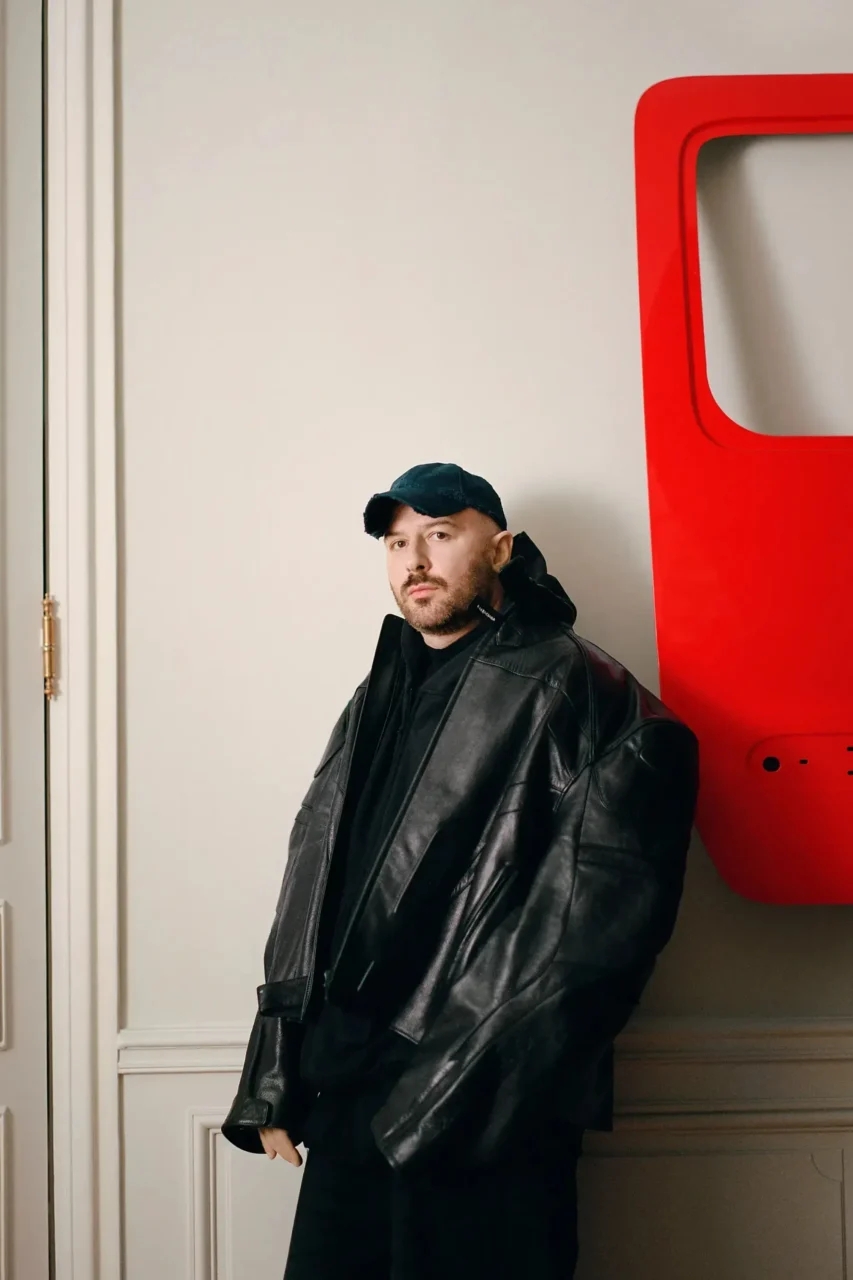A child gazing at the camera through a translucent sari; a Hong Kong sunrise; the smiling face of British centenarian Captain Tom — these are just some of the images to be found in the September issues of Vogue’s 26 global editions as they unite around the theme of hope.
To mark the project’s launch, each of the 26 editors-in-chief has selected one photograph or illustration from their print publication and told us why it fills them with hope for the future. Some honour public figures working to help those worst affected by the pandemic, while others feature boundary-pushing artists, serene landscapes that remind us of the power of nature, and portraits of the next generation who are determined to make the world a better place. Browse the spectacular images and hear the moving stories behind them from the editors-in-chief themselves, below.
American Vogue, Anna Wintour
“During this pandemic, New York’s Governor Andrew Cuomo has been everything our president is not — forthright, honest, reassuring, led by science and facts. Who better to ask about hope? What the governor had to say on the subject made me proud to be a New Yorker. Sometimes words (and an iconic Milton Glaser logo) paint the best picture.”
British Vogue, Edward Enninful
“The subject of our portrait, Captain Tom, represents, in a way, a very British take on hope — an unsuspecting hero who performed a remarkable feat in unremarkable surroundings. In April, just weeks from his 100th birthday, the second world war veteran decided to walk 100 lengths of his back garden in an attempt to raise £1,000 for the NHS. But word spread through the media and within days, he’d raised £500,000, which rapidly rose to £32m, and was soon followed by a knighthood from the Queen and a number one single — along the way, giving hope to a nation that, for a moment, needed it more than ever.”
Vogue Arabia, Manuel Arnaut
“Emirati artist Sumayyah Al Suwaidi’s arresting artwork, A Fishing Hope, incorporates one of the most enduring symbols of the Gulf region: the traditional wooden boat, the abra. In this surrealist piece, the abra becomes a vessel for hope. ‘When you go fishing, you hope to catch something, and you prepare for it. If the fisherman is not prepared, he will never catch anything. So it is in life, too,’ explains the artist. ‘A person must be prepared to do what’s needed to succeed and leave the rest to the universe.’ I find this artwork by the Abu Dhabi-based artist intriguing and inspiring — it perfectly represents the modernity of the Gulf, while respecting its rich traditions.”
Vogue Australia, Edwina McCann
“Betty Muffler is not only an incredible artist, she is also a Ngangkari — a traditional Indigenous Australian healer with a powerful gift to assist others through her spirit and touch. She hails from Iwantja Arts in the remote Indulkana Community in far north-east South Australia, approximately 400km south of Alice Springs. In the wake of last summer’s devastating bushfire season, the Covid-19 pandemic and the Black Lives Matter movement, I wanted to select a uniquely Australian image that represents hope, healing and solidarity for us all. Betty’s healing powers and positive energy are embedded in this work thanks to the red ochre pigment — taken directly from her Country — and the lace-like song lines that represent the movement of her spirit flying through the sky.”
Vogue Brazil, Paula Merlo
“The artist Samuel de Saboia and the photographer Rafael Pavarotti (who shot de Saboia) are two creative minds of the Brazilian new generation, representing the strength and excellence of the black culture in our country. In this piece, the bird symbolises all species on the verge of extinction or that live in captivity, but still sing together as a sign of hope and unity. The colours vibrate the capacity to incorporate emotions and the dream of freedom.”
Vogue China, Angelica Cheung
“Artist Wang Yong looked to ancient Chinese history for his hope inspiration, with a work entitled Circle. In particular, Wang sought inspiration from the Han dynasty, known as an era when art and architecture flourished some 2,000 years ago. It was the tradition to have round eaves on buildings, with engraved drawings and texts to send out good wishes and hope for the future.
Wang referenced a tile from that period engraved with 12 characters that collectively spell out a message of peace and wellbeing for people all over the world. The circle represents the number zero, reflecting the artist’s wishes that Covid-19 infection figures will reach that target in the near future. The circle also represents wholeness and perfection.
The artist took the project very seriously and undertook deep research into Chinese history to find suitable inspiration. Anyone reading the characters in Chinese would grasp that the artist is addressing a sombre topic, while ultimately conveying a message that people should be positive and look forwards with hope.
We can all relate to that message during these troubled times. Wang works across many mediums, but for this one he stuck to the basics, using ink on paper with just a touch of red — a colour that, in itself, symbolises happiness in Chinese culture.”
Vogue CS, Andrea Běhounková
“2020 has been, in many ways, eye-opening and sobering. But quietly meditating is not enough. Our only hope is to step up and act, to speak up and stand firmly behind what we believe to be fundamental. The lone pine has stood its ground for 350 years. It has been through tough times and storms, both literal and political, through calamities brought on by both man and bark beetle. It is time we listened to nature and learned from her.”
Vogue Germany, Christiane Arp
“In my eyes, professor and doctor Marylyn Addo embodies all our hope that sooner or later there will be a ‘normal’ again — a new normal, where nothing will be as it was before. As one of the worldwide-leading scientists in infectiology and virology, she is confident that there will be a vaccine against Covid-19 available soon. Her optimistic belief in global scientific teamwork without borders emphasises my hope for a world without any borders in our minds and hearts.”
Vogue Greece, Thaleia Karafyllidou
“This photo reminds everyone in my team of our childhood summer memories. That time when we were carefree, happy, one with nature. When we were enjoying life to the fullest. This is an image of two young people filled with joy, holding each other, diving into the sea and light. The light that we all need in our lives. The light that gives us hope. Hope of a better day!”
Vogue Hong Kong, Kat Yeung
“To everyone at Vogue Hong Kong, a sunrise represents hope in the beginning of a new day. Captured beautifully and poetically by photographer Michael Wolf, the sunrise symbolises that no matter who you are, and where you are, we all live ‘under the same big sky’.”
Vogue India, Priya Tanna
“In our quest for hope we found our common humanity, and a unifying thread in a generation that will inherit the world from us. The imagery is simple: a child’s gaze through a sheer handwoven sari designed by one of our leading designers and made by our artisans and craftspeople, captured by one of the country’s emerging photographers — representing at once India’s past, current and future.”
Vogue Italia, Emanuele Farneti
“We wanted to represent hope as a ray of light shattering the darkness. This is why we chose Massimo Vitali’s photograph, a joyful symbol of the summer that arrives after a cold winter, a glimpse of the carefree, happy attitude that has always characterised the Italian way of life — a symbol of togetherness and love.”
Vogue Japan, Mitsuko Watanabe
“In Japan, Mount Fuji has been the one and only centre for nature worship from ancient times, and it continues to be a symbol for the wishes and hopes of the people. It’s presence is not only the most beautiful, but also inspires a sense of awe for nature. It examines the relationship between humans and nature as well. Mount Fuji, taken from the home of Daidō Moriyama, one of Japan’s leading photographers, quietly watches over the city and people at sunset. The sacred presence of Mount Fuji feels like the sliver of hope in the darkness of the night.”
Vogue Korea, Kwangho Shin
“What makes the post-corona era more humane? Nothing comes closer than human connection. With that, we have the Deokbune Challenge, which translates to the Thanks Challenge. Celebrities and citizens alike carry on posting this sign language on their social platforms to thank and pay respect to those helping to combat the virus. This image became a national icon after being turned into a badge and stickers. Here, faces of Korean fashion (Hyun Ji Shin, Sohyun Jung, Heejung Park, Yoon Young Bae) spread hope with the Deokbune pose.”
Vogue Mexico and Latin America, Karla Martínez
“For the past couple of months, our team has been working at home. The crisis in Mexico and Latin America continues to grow. With so much uncertainty around the world and in our region, the idea that by September things will be better is hard to fathom, but one thing that you can say about Latin Americans is that we are always hopeful.
The idea of hope, esperanza in Spanish, is something that we are taught from a very young age in Latin America. In many Latin American countries, we have lived through civil wars, drug wars, corrupt governments, domestic violence, and the crisis came to add another layer of uncertainty. As with all crises, we believe in the power of community and working together to create a better space for the people we love.
During this time more than ever, we believe in the power of community and helping each other. We worked with Latino photographer Stefan Ruiz who shared an image of a fisherman from a small town in Pátzcuaro, Mexico, as they were fishing. These men have a specific technique and always go out to fish together. As Latinos, we come together and work to make a brighter future full of hope for the next generation. This is how we will overcome the many obstacles that lie ahead.”
Vogue Netherlands, Rinke Tjepkema
“Temporarily sacrificing your own needs to help protect those more vulnerable was crucial when social distancing during lockdown. In the Netherlands, Dunja van der Heijden quarantined her grandfather Fred for two weeks when, at 94, he tested positive for Covid-19. She was right next to his bed when he died, a symbiotic ending to their relationship. Dunja was photographed wearing her grandfather’s favourite fisherman’s sweater.”
Vogue Paris, Emmanuelle Alt
“In these difficult times, I am glad and honoured to be part of this incredible initiative, to unite the 26 worldwide editions of Vogue in one unique, strong voice. At Vogue Paris, we decided to highlight more than ever youth, diversity, inclusivity and awareness, which are to us the epitome of hope today.”
Vogue Poland, Filip Niedenthal
“Poland currently finds itself in a state of turmoil. My hope for our country — and indeed for our planet — lies in its youth, in the wonderful young people I meet who are eager to prove that they know just as well, if not better, what is best for us. I am impressed by their maturity as well as their optimism, by the traits, so natural to them, that I sometimes find lacking in older generations: openness, responsibility, empathy. Vogue Poland has chosen this particular group of students because of their diverse backgrounds and common interest — to make the world a better place. I trust it will be, thanks to them.”
Vogue Portugal, Sofia Lucas
“Helping each other. Supporting one another. Being the best version of ourselves. Knowing that no matter what, we will always try to elevate everyone around us and never push them down. Hope is knowing there’s a helping hand around the corner, no matter how bad things are. That’s hope. And that’s why this allegory of spoons we’ve inspired our image on fits this theme so much. But above all, it fits the times we’re going through perfectly. In a time when love turns to hate in a split second, we can only hope that people come together for each other.”
Vogue Russia, Masha Fedorova
“The author of the September cover of Vogue Russia is Erik Bulatov [the piece is titled Nadeshda]. He is a classic of Sots art [Soviet Pop Art] and an artist of the level and scale of David Hockney and John Baldessari. Back in the 1970s, in the late Soviet Union, he became famous for works that combined the rhetoric of the Soviet poster and landscape painting, and now, living in Paris, remains one of the most famous and expensive Russian artists. The last show of Gosha Rubchinskiy took place against the background of his work Freedom. Надежда (‘hope’ in Russian), flying in the clouds, is a universal symbol for us, in which every person on Earth can put their meanings and aspirations. We at Vogue believe in the power of words, art and visualisation as much as we believe in style and taste.”
Vogue Singapore, Norman Tan
“When choosing a visual representation of hope for Singapore, we wanted to combine the past with our future. The Vanda Miss Joaquim orchid was named the national flower of Singapore in 1981. It was chosen for its vibrant colour as well as its hardiness and resilience — key attributes of the Singapore spirit and also, of a bold Vogue Singapore in this new era.
As a nod to this, we named an orchid after the magazine, the Vanda Vogue Singapore, but commissioned a 3D render of the flower to demonstrate that while we are proudly rooted in our heritage, we have our eyes firmly fixed on fashioning a new future.
Combined with an exclusive piece of prose from Singapore-born author and the youngest winner of the Singapore Literature Prize Amanda Lee Koe, our desire is that the 3D Vanda Vogue Singapore orchid will be a beacon of hope; a reminder that beautiful things need to be fought for; that dreams don’t come without their battles; that together, we can come through stronger.”
Vogue Spain, Eugenia de la Torriente
“The Edge of the Sea is an original artwork by Coco Capitán that perfectly sums up what most of our country has dreamt about during the last months: the freedom of the sea and the hope that the storm has passed. Coco is a brilliant Spanish artist that lensed this carefree picture when she was 18 years old in Mallorca. Almost 10 years later, her unique handwriting updates the image in a new world with a completely different meaning.”
Vogue Taiwan, Leslie Sun
“Folk is a big part of our traditional culture, and although this particular divination ritual may not be practised by the entire population, I do trust that everyone hopes for their wish to be granted with a positive outcome. The ritual of casting these crescent-shaped blocks is called bwa bwei in Taiwanese, and when they land with one bulged side and one flat side facing upwards, as shown in the photograph, it represents the divine answer, ‘yes’.”
Vogue Thailand, Kullawit Laosuksri (Ford)
“Simply, every birth generates hope. The close-up face of this lovely newborn infant [in Sootket Jiwpanit’s photograph New World] symbolises the new beginning of not only life itself, but also the situations around it. Sootket Jiwpanit is our proud Vogue veteran from day one, whose sentiment and delicacy through his photography has been loved by so many.
Aastha is the form of faith and beliefs that is widely practiced in Thailand, such as building religious artefacts like temples and Lord Buddha statues. This Buddha statue in this photograph [Under Construction by Aekarat Ubonsri] is arguably the biggest statue in this region. Once the construction is completed, the piece will be the centre of hope for the entire community.”
Vogue Turkey
“Having survived many natural disasters and economic depressions since the 15th century, the Grand Bazaar represents strength, resilience and hope at its core. As a symbol of artisanship, tradition, inclusivity and diversity for centuries, it is a reminder that no matter the challenges, much like this historic structure, we too will evolve in the face of hardships and overcome whatever life has in store for us by embracing our most cherished values. We did this special photoshoot atop the Bazaar, showcasing its beautifully designed roofs and domes along with the blue skies. As Turkey’s most authentic self, this is a place of hope that merges the past with the present and the present with the future. It connects Istanbul to the world and the world to Istanbul.”
Vogue Ukraine, Vlasov Philipр
“In her creative practice, artist (and also gardener) Alevtina Kakhidze uses drawing and text, unadorned. We are very fond of this imposed simplicity. Through her drawings, Alevtina, who was born in eastern Ukraine, explores gender, social conflicts and environmental issues, the latter being the topic of the work we commissioned — her self-portrait in the future where synthetic fabrics would be replaced with vegetal. The drawing, ‘Alevtina Kakhidze thanks the plants for pantyhose in 2050’ is touching and hopeful, with a hint of irony, produced in a pseudo-primitive manner — and precisely because of that, the artist is so convincing.”
Editor
Vogue


